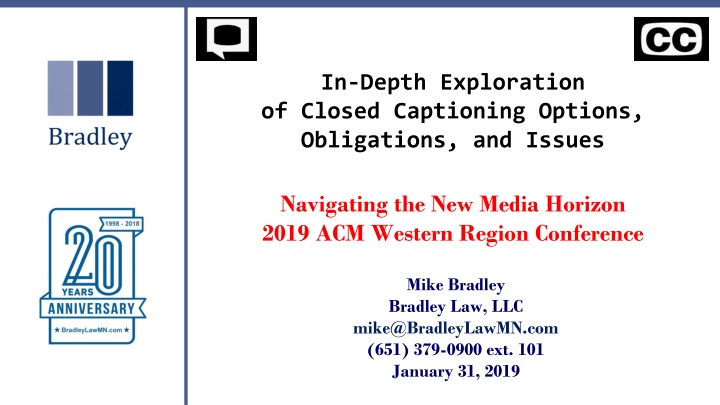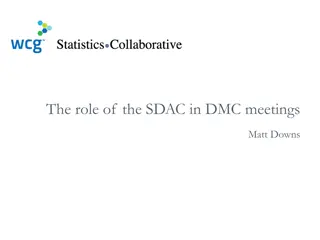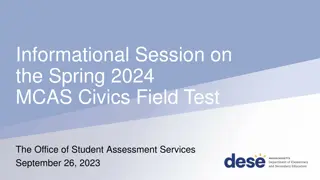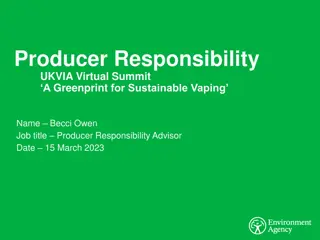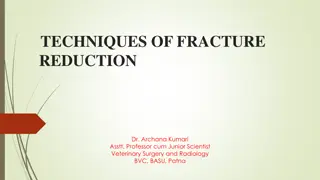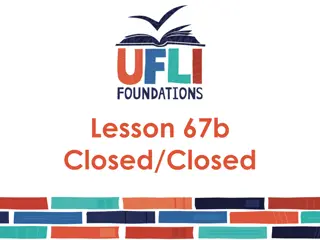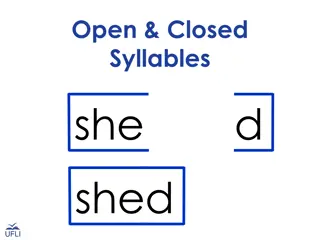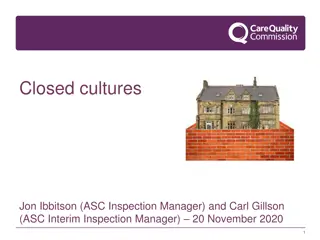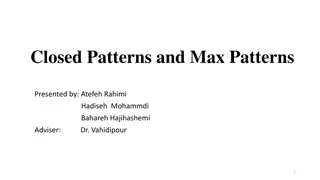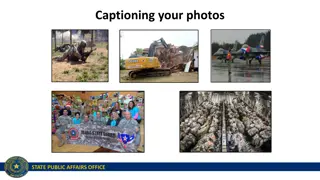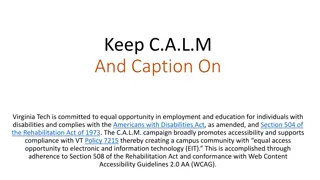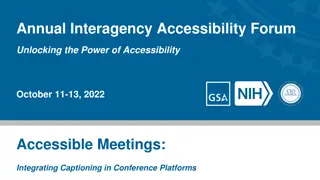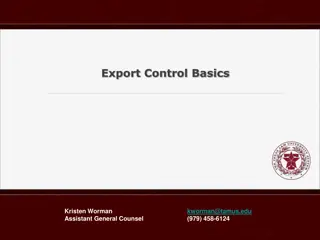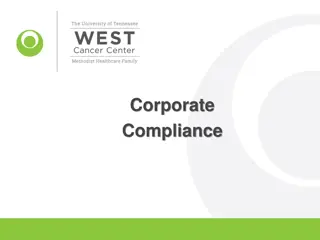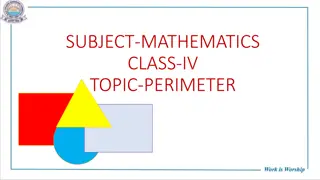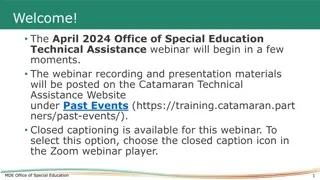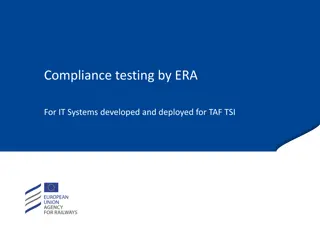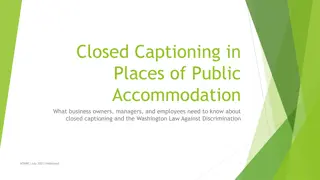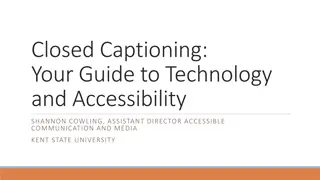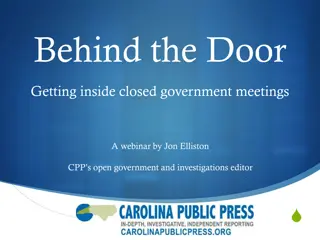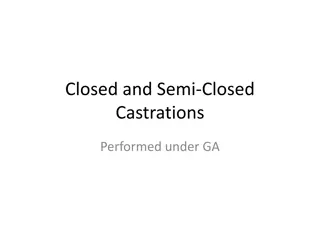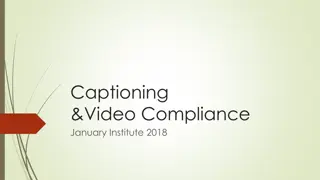Closed Captioning Regulations and Compliance Overview
Dive into the complexities of closed captioning requirements under The Rehabilitation Act, Federal Cable Act, and FCC rules. Understand exemptions, obligations, and best practices for ensuring accessibility in media content.
Download Presentation

Please find below an Image/Link to download the presentation.
The content on the website is provided AS IS for your information and personal use only. It may not be sold, licensed, or shared on other websites without obtaining consent from the author.If you encounter any issues during the download, it is possible that the publisher has removed the file from their server.
You are allowed to download the files provided on this website for personal or commercial use, subject to the condition that they are used lawfully. All files are the property of their respective owners.
The content on the website is provided AS IS for your information and personal use only. It may not be sold, licensed, or shared on other websites without obtaining consent from the author.
E N D
Presentation Transcript
In-Depth Exploration of Closed Captioning Options, Obligations, and Issues Navigating the New Media Horizon 2019 ACM Western Region Conference Mike Bradley Bradley Law, LLC mike@BradleyLawMN.com (651) 379-0900 ext. 101 January 31, 2019
Agenda The Rehabilitation Act The Cable Act and FCC Compliance ADA Compliance Best Practices for Local Governments
The Rehabilitation Act Beware of This Incorrect 2018 Vendor Statement New Section 508 standards went into effect Thursday, January 18. Governments live streaming or recording public meetings now need closed captioning to be compliant. Sec 508 of the Rehabilitation Act Generally does not apply to local governments Look at 508 if your city is receiving federal aid Applies to Federal Agencies
Federal Cable Act and FCC CC Rules The Communications Act and FCC Rules Apply (unless exemption) Video Programming Distributors must provide closed captioning 47 U.S.C. 613; 47 C.F.R. 79.1 PEG Programmers arguably subject to these rules If not exempt
FCC PEG Channel Exemption Closed captioning not required if the captioning expense would exceed 2% of gross revenues. Any channel producing revenues below $3M annually is exempt from the closed captioning requirements of the Communications Act. 47 CFR 79.1(d)(11). No PEG Channel Produces Revenues of $3M All PEG Channels are Exempt from FCC Closed Captioning Requirement
PEG Web Streaming and CC Twenty-First Century Communications and Video Accessibility Act of 2010 (CVAA) Required FCC to Create CC Rules for Web Streaming FCC Issued Rules in 2012, 2013, 2014 and 2016 FCC Rules Must CC if CC for TV Programming CC Not Required if PEG Op is Not CC for TV If PEG Op does CC for TV Must CC for Stream
FCC New Self-Reporting Requirement FCC Second Report and Order February 19, 2016. FCC implemented a new rule Requires all video programmers to self-report compliance or exemptions to the FCC s closed captioning rules on a yearly basis Starting in July 2016! But FCC Still Hasn t Set Up Online Reporting! Maybe 2019?
The Americans with Disabilities Act ADA Title II Applies to Local Governments Prohibits discrimination against persons with disabilities In all programs, services, and activities of state and local government. Even if Carried Out by Contractors Including Non-Profit Corporations Effective Communications Requirement When governments seek to communicate with the public, they must do so by means that are as effective to those with disabilities as to others.
The ADA Applies to PEG Does the ADA Title II apply to PEG? DOJ Says Yes. https://www.fcc.gov/news-events/events/2015/11/roundtable-discussion-of-closed- captioning-for-public-access-and-governmental-programming FCC Roundtable on CC (Nov. 2015) - Minutes 31-36 ADA applies to all Government-produced programming Public Access If produced by the Government or Non-Profit Contractor Governmental Access Typically all produced by government entity Educational Access Typically all produced by Educational Institution
Example - ADA Application to Access TV DOJ Nondiscrimination Rules implementing Title II Television and videotape programming produced by public entities are covered by Title II of the ADA. Explicitly inclusive of state and local governments and their subdivisions and instrumentalities Include the City s government access channel, since it is television programming produced by a City department. Therefore, the City s government access channel must provide effective communication to disabled persons under the ADA. Authority: Nondiscrimination Rules, 56 Fed. Reg. 35694 (July 26, 1991), available at http://www.ada.gov/reg2.html
Providing Effective Communications Effective communication is accomplished through auxiliary aids and services. e.g. Closed Captioning In determining what type of auxiliary aid and service is necessary, a public entity shall give primary consideration to the requests of the individual with disabilities. Authority: 28 C.F.R. 35.160 (2009)
ADA Exemption - Reasonableness Standard The broad mandate of Title II accommodations is limited by a reasonableness standard. Exempts public entities from compliance If providing auxiliary aids or services would result in a fundamental alteration in the nature of a service, program, or activity or in undue financial and administrative burdens. Many (but not all) PEG Operations/Local Governments have limited financial and administrative resources May therefore be exempt from full compliance with Title II but still must comply with the maximum extent possible
ADA Compliance Best Practices Determine what options it has to provide effective communications to disabled persons. Such as Closed Captioning. Study different methods to provide closed captioning Live Captioning A.I. - Hybrid
ADA Compliance Best Practices Consider how you can meet the needs of the disabled to the maximum extent possible Determine the financial and administrative burden each option would have, considering all resources available to the Local Government/PEG Operator. Prepare a Compliance Plan Prepare a Written Statement If you conclude that closed captioning and/or other auxiliary aids or services would create an undue burden. Signed by Head of Public Agency (or designee)
Sample Closed Captioning Study Consider Group of LFAs to Reduce Costs Identify Legal Standards State and Federal Identify Closed Captioning Services and Equipment Identifying Costs Identify Applicable Budget Identify Administrative and Financial Costs Determine Compliance Not a one size fits all Each Jurisdiction may have different outcome Different Programming Different Sizes and Budgets Different Budgeting Priorities Different Equipment and Staff (skills and size)
Conclusion Conduct ADA Compliance Due Diligence ADA Requires Action by Local Government In order to insure ADA compliance, Cities must provide disabled persons appropriate auxiliary aids and services for its PEG programming, unless it claims an exemption from the DOJ rules. Remember to Self-Report to the FCC! If FCC Develops On-Line Reporting
Thanks for Inviting Me! Mike Bradley is an attorney, with 25 years of experience, practicing in the area of municipal telecommunications and cable franchising. He is the founding partner of Bradley Law, LLC, a law firm based in the Twin Cities and is Special Counsel to the Seattle-based municipal law firm the Lighthouse Law Group. Throughout his career, Mike has advised PEG Organizations. He is currently working with PEG providers on closed captioning ADA compliance. Mike also represents cities on cable franchising and wireless siting matters. He is working with many cities on updating municipal codes addressing small cell wireless siting. Mike is also the past chair of the Communications Law Section of the Minnesota State Bar Association and was elected to serve on the Board of Directors for the Ramsey County Bar Association. Mike is an AV rated attorney by Martindale Hubble and has been recognized as a Communications Law Super Lawyer by Super Lawyer Magazine.
